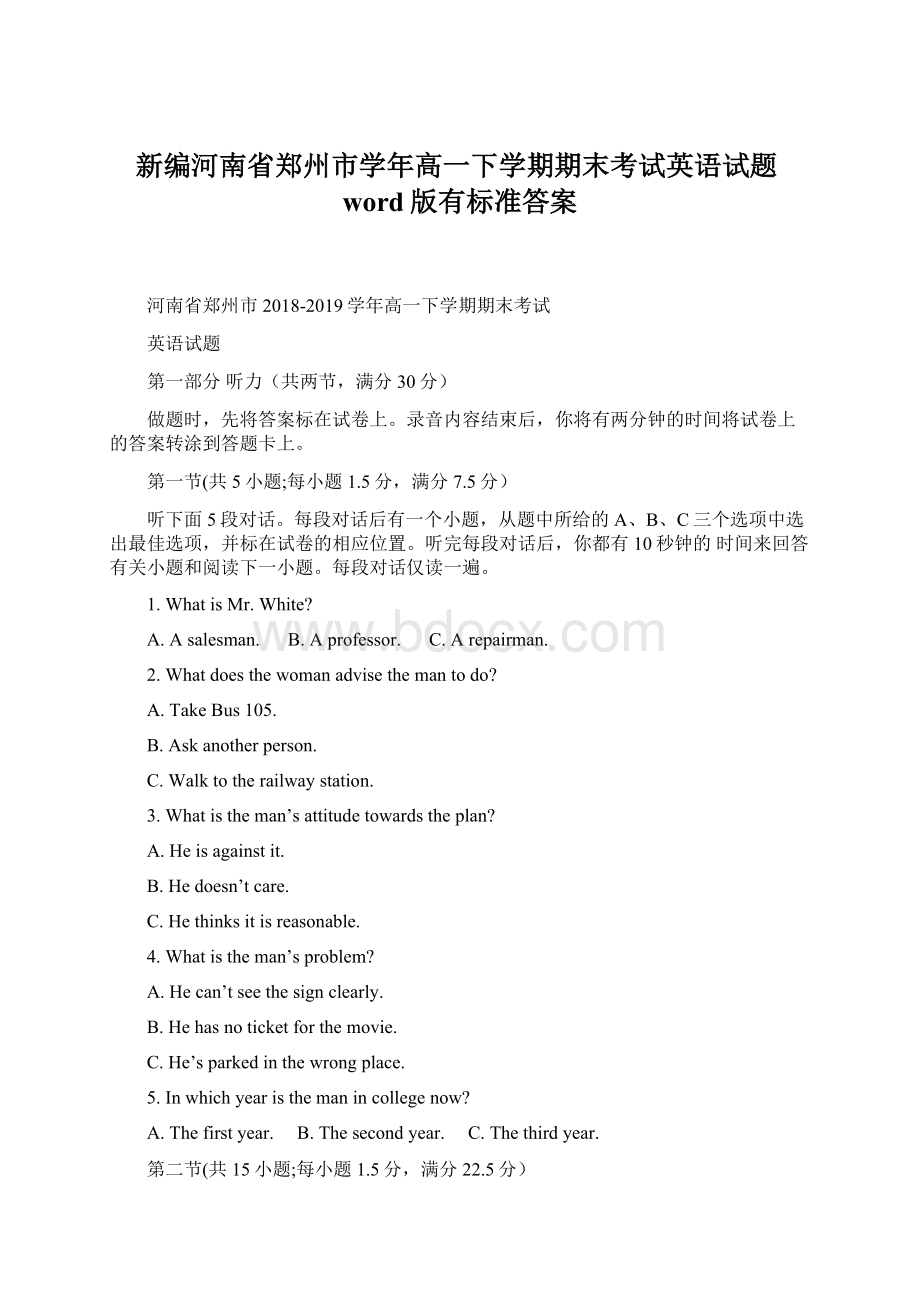新编河南省郑州市学年高一下学期期末考试英语试题word版有标准答案.docx
《新编河南省郑州市学年高一下学期期末考试英语试题word版有标准答案.docx》由会员分享,可在线阅读,更多相关《新编河南省郑州市学年高一下学期期末考试英语试题word版有标准答案.docx(13页珍藏版)》请在冰豆网上搜索。

新编河南省郑州市学年高一下学期期末考试英语试题word版有标准答案
河南省郑州市2018-2019学年高一下学期期末考试
英语试题
第一部分听力(共两节,满分30分)
做题时,先将答案标在试卷上。
录音内容结束后,你将有两分钟的时间将试卷上的答案转涂到答题卡上。
第一节(共5小题;每小题1.5分,满分7.5分)
听下面5段对话。
每段对话后有一个小题,从题中所给的A、B、C三个选项中选出最佳选项,并标在试卷的相应位置。
听完每段对话后,你都有10秒钟的时间来回答有关小题和阅读下一小题。
每段对话仅读一遍。
1.WhatisMr.White?
A.Asalesman.B.Aprofessor.C.Arepairman.
2.Whatdoesthewomanadvisethemantodo?
A.TakeBus105.
B.Askanotherperson.
C.Walktotherailwaystation.
3.Whatistheman’sattitudetowardstheplan?
A.Heisagainstit.
B.Hedoesn’tcare.
C.Hethinksitisreasonable.
4.Whatistheman’sproblem?
A.Hecan’tseethesignclearly.
B.Hehasnoticketforthemovie.
C.He’sparkedinthewrongplace.
5.Inwhichyearisthemanincollegenow?
A.Thefirstyear.B.Thesecondyear.C.Thethirdyear.
第二节(共15小题;每小题1.5分,满分22.5分)
听下面5段对话或独白。
每段对话或独白后有几个小题,从题中所给的A、B、C三个选项中选出最佳选项,并标在试卷的相应位置。
听每段对话或独白前,你将有时间阅读各个小题,每小题5秒钟;听完后,各小题将给出5秒钟的作答时间。
每段对话或独白读两遍。
听第6段材料,回答第6、7题。
6.Wheredoesthewomanwanttogo?
A.Thepostoffice.B.Thecinema.C.Apark.
7.Whocanhelpthewoman?
A.Themanwithabird.
B.Themanwithabeard.
C.Themanwithabottleofbeer.
听第7段材料,回答第8至10题。
8.WhyisJessiestillathome?
A.Shetakesthedayoff.
B.Shehasenoughtimetogotowork.
C.Sheiswaitingforthemantogoouttogether.
9.WhatdoesJessiethinkoftakingthesubway?
A.Convenientandcheap.
B.Crowdedandexpensive.
C.Convenientbutexpensive.
10.WhatdoweknowaboutJessie?
A.Sheusedtohavebreakfastinheroffice.
B.Herofficeisfarawayfromthesubwaystation.
C.Shedoesn’thavetowaitforbusesandtaxisinbadweather.
听第8段材料,回答第11至13题。
11.Whatarethetwospeakersmainlytalkingabout?
A.Aplanfortheparty.
B.Avisittotheirrelatives.
C.Acalltotheircolsefriends.
12.WhyisthewomanthinkingofcallingonAnn?
A.Annhasjustgotanewhouse.
B.Annhasjustcomeoutofhospital.
C.ShewantstoinviteAnntotheparty.
13.Whycan’ttheyhavealittlepartyatRick’s?
A.Heisstillinhospital.
B.Hestilldoesn’tfeelwell.
C.Hedoesn’tlikenoisyparties.
听第9段材料,回答第14至16题。
14.Whoarethetwospeakers?
A.Amanandhiswife.
B.Amanandhissister.
C.Amanandhisgirlfriend.
15.Whatdoesthemanusuallydoatweekends?
A.Hehasteawithhisfriends.
B.Hegoesshoppingwithhisfriends.
C.HewatchesfootballgamesonTV.
16.Onwhichpointofthepicnicisthemandifferentfromthewoman?
A.Whoshouldgetthecarready.
B.Howmanyfriendstheyshouldinvite.
C.Whatfoodanddrinktheyshouldprepare.
听第10段材料,回答第17至20题。
17.Howdostudentsenterthelibrary?
A.Withapassword.
B.Withastudentcard.
C.Withalibraryaccount.
18.Howmanybookscanstudentsborrowatmostonce?
A.Nine.B.Eleven.C.Twelve.
19.Whatkindofbookhastobereturnedwithinoneweek?
A.Bookspublishedrecently.
B.Bookslikedbyalotofpeople.
C.Booksborrowedbylocalresidents.
20.Whatwillthespeakerdonext?
A.Takethestudentsonacampustour.
B.Showthestudentsaroundthelibrary.
C.Tellthestudentswheretogetbottledwater.
第二部分阅读理解(共两节,满分40分)
第一节(共15小题;每小题2分,满分30分)
阅读下列短文,从每题所给的A、B、C和D四个选项中,选出最佳选项,并在答题卡上将该项涂黑。
A
Slang(俚语)isveryinformallanguagewhichisoftenusedbyyoungpeople.It’shardtokeepuptodatewithitasnewwordsandphrasesappearanddevelop.Livinginamulticulturalsocietyhasaneffectonlanguage,especiallyontheyoung,whosefriendsareoftenfromamixofbackgrounds.TVandmusicalsohaveabiginfluence.Acompletelistofslangisdifficulttomake.Bythetimeitisfinished,thelistwillbeoutofdate.However,hereareafewexamples:
“Safe”,“sorted”,“sound”or“cool”allmeans“That’sgood”or“Iunderstand”.
Insteadofusingdifferenttagquestions(附加疑问句)like“…isn’tit?
”,“…can’tyou?
”or“…don’tthey?
”,peopleuse“innit”.Forexample,“Hecandancereallywell,innit?
”(=Hecandancereallywell,can’the?
)or“Theyalwayssaythat,innit?
”(=Theyalwayssaythat,don’tthey?
)
Insteadofsaying“very”,“really”or“completely”,peopleuse“well”.Forexample,“I’mwelltired.”or“Yougotitwellwrong!
”
“Whatever”means“Idon’tcare”.Forexample,A:
“Buttheteachersayswecan’tleaveuntilwe’vefinished.”B:
“Whatever.I’mgoing.”
“He’sfine”or“He’sfit”bothmeans“He’sgood-looking”.“Fine”and“fit”candescribeaboyoragirl.
Noteverybodyusesslangandnoteverybodylikesit.AschoolinthenorthofEnglandrecentlytolditspupilstostopusingslangwordssuchas“hiya”(hello),cheers”and“ta”(bothmean“thankyou”)iftheywanttogetaplaceatuniversityoragoodjob.
WhenBritishpeopleuselanguagelikethis,it’snosurprisethatsomesaytheycan’tunderstandnativespeakers.Butperhapslearnersdon’tneedtoworrysomuch.ResearchshowsthatmostoftheEnglishspokenaroundtheworldtodayisbetweennon-nativespeakersofthelanguage.
So,howimportantisittounderstandtheseslangwordsandexpressions?
IfyouwatchfilmsorTVinEnglish,readmagazinesinEnglish,chatonlineinEnglishorareinterestedinEnglishlyrics(歌词),thenunderstandingslangcanbeveryuseful.Youprobablywon’tseemuchslanginyourEnglishexamination,though.
21.Whyisithardtomakeacompletelistofslang?
A.Manyslangwordsareoutdated.
B.Itismostlyusedbyyoungpeople.
C.Modemslangchangesveryquickly.,
D.Itisfromdifferentculturalbackgrounds.
22.Whichofthefollowingmeans“Iunderstand”?
A.Sorted.B.Innit.C.Whatever.D.Cheers.
23.Whatcanbeinferredaboutslangfromthetext?
A.Itpreventslanguagefromdeveloping.
B.ItisalsospreadthroughTVandmusic.
C.ItismorepopularintheUKthanintheUS.
D.IthasfounditswayintoformalwrittenEnglish.
24.Whatcanbeconcludedfromthetext?
A.ManyUKschoolsareencouragingstudentstouseslang.
B.ItispossibleforEnglishlearnerstomastersomeBritishslang.
C.Knowinglittleslangdoesn’tgreatlyaffecthowonecommunicates.
D.MoreEnglishisspokenbynativespeakersthanbynon-nativespeakers.
B
It’saclassroom.Insteadofbeingtoldtositquietlyandlisten,youareencouragedtostandup,jumparound,imagineandactout.It’saclassfulloflaughterandapplause(鼓掌),emotionandenergy.Welcometodramaclass,oneofmyfavoriteclassesathighschool.
Indramaclassweusedtoplayalotof“dramagames”.Wewouldimprovise(即兴表演),copyandabovealluseourimagination.
Myfavoritegamewascalled“Spotto”.Onepersonstoodinthefrontoftheclassandperformedascene,completelyoutoftheirimagination.Whenoneaudiencememberyelled“Spotto!
”,theperformerhadtofreeze.ThenthepersonwhohadyelledSpottohadtogetupandimproviseanewscenario(剧情)basedonthepositionthefirstperformerfrozein.Thiswentonasmoreandmorepeoplewereaddedtothescene.Eventuallytheentireclasswouldhavejoinedthescene.Thentheperformerswouldstarttoleaveinreverse(颠倒的)order.
Itwasalotoffun,andagoodtestofeveryone’simaginationtoseewhattheywouldcomeupwith.Dramaclassatmyschoolofteninvolvedabigperformanceattheendofthetermaswell.Wewouldworkonaproductionthroughoutthetermandputonashowforourparentsandtheschoolcommunity.
Itwasagreatexperiencetoperformonstageinfrontofalargeaudience.Dramaclasscanhelpshychildren,likeme,tocomeoutoftheirshells.Ithelpedthembecomemoreconfidentanddevelopedtheirpublicspeakingskills.Dramaclassisalsoagreatplacetoexpressoneself,andawayforchildrentouseupsomeoftheirenergy.
25.Whichdoyouagreewithaboutthegame“Spotto”?
A.Eachperformerinthegamehastoretellthestoryofthelatterperformer.
B.Aperformerhastoshowastoryunrelatedtothatoftheformerperformer.
C.Everystudentgetsthechancetomakeacontributiontothe“Spotto”game.
D.Itisdesignedtohelpdramastudentslearnfromoneanother’sperformance.
26.Theunderlinedword“them”inthelastparagraphrefersto“”.
A.shychildrenB.alargeaudience
C.dramastudentsD.thewholeclass
27.Whatdoyouknowabouttheauthoraccordingtothearticle?
A.Hewastooshytoattendthedramaclass.
B.Hewasastarstudentinthedramagames.
C.Hewasshininginbigperformanceseachterm.
D.Hewashappytoperformonstageinfrontoftheaudience.
28.Whatdoestheauthormainlyintendtotellusinthearticle?
A.Afewdramagamesforfun.
B.Howtoimprovedramaskills.
C.Unforgettableexperiencesonstage.
D.Oneofhisfavoritehighschoolcourses.
C
Fromthelossofwildlifetorisingsealevels,we’reallwellawareoftheproblemsthatclimatechangecouldcause.Butwhileitmayseemlikesuchissueswon’taffectmostofusdirectly,itlookslikefuturegenerationscouldgrowupwithoutsomethingthatmanyofusnowtakeforgranted:
chocolate.
AccordingtoanessaypublishedbytheUSNationalOceanicandAtmosphericAdministration,changestotheclimateintheareasthatproducecacao—theplantfromwhichchocolateisproduced—maymeanthatitwillsoonbecomeextinct.
Mostoftheworld’scacaogrowsincountriesclosetotheequator(赤道),withoverhalfofitgrowingintheAfricannationsofGhanaandIvoryCoast.It’spredictedthatby2050,climatechangewillhavespeduptherateatwhichtemperaturesinthesecountriesrise,makingitextremelydifficultforcacaotogrowthere.Theproblemdoesn’tlieinincreasedheat,butinlowerhumidity(湿度),asit’sbelievedthatrainfallwillstayatthesamelevelifthetemperaturerises.
“Inotherwords,ashighertemperaturessqueezemorewateroutofsoilandplants,it’sunlikelythatrainfa